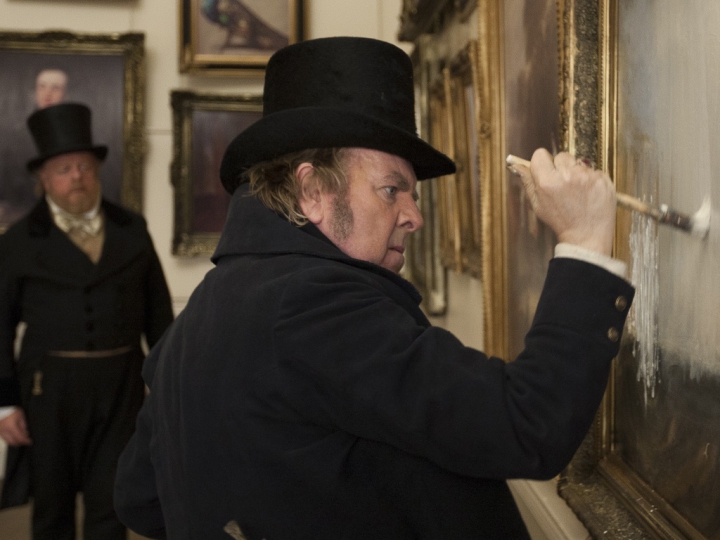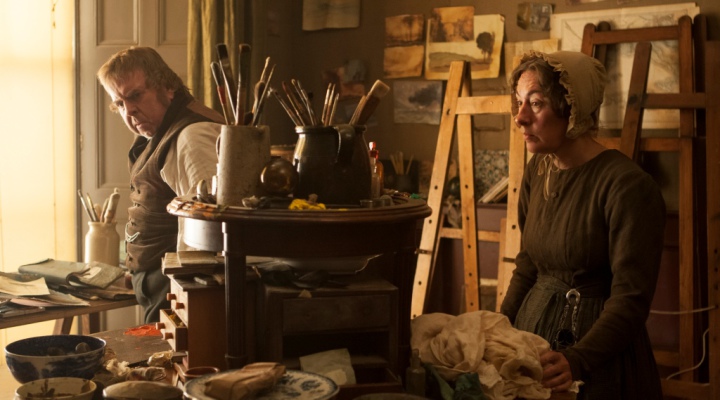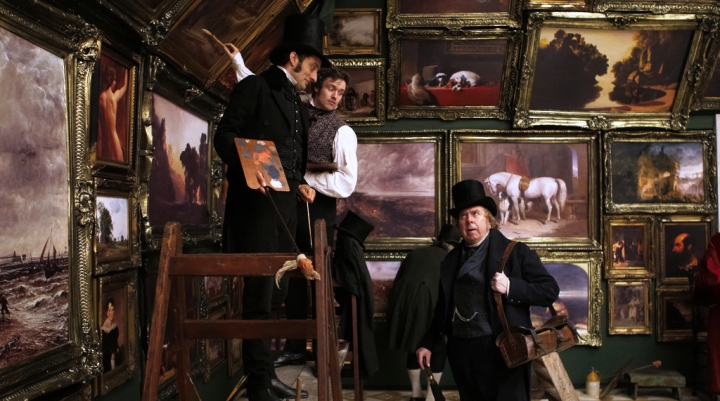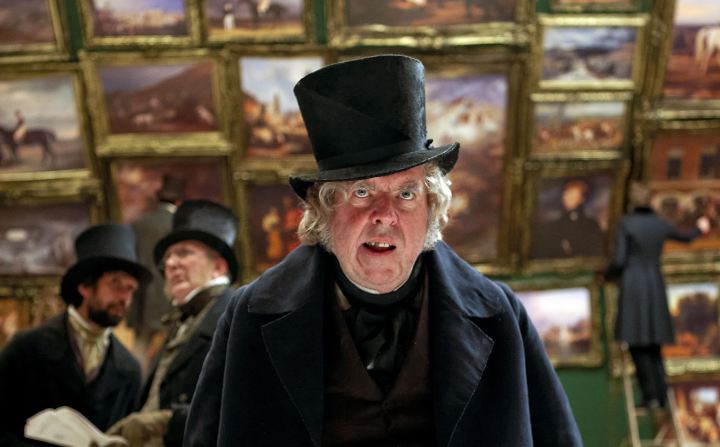Calling Mike Leigh’s Mr. Turner a biographical drama is grasping at straws for a genre. It is most certainly not a biopic in any sense of the word. Put it up against 2014’s big noise biopics — The Theory of Everything, Unbroken, American Sniper, even The Imitation Game — and you’ll see what I mean. It’s nothing like them. In fact, the two-and-a-half-hour trip into the mind and times of the British painter J.M.W. Turner (Timothy Spall in what should have been an Oscar winning performance) isn’t really like anything else. The closest thing to it is probably Leigh’s 1999 film on Gilbert and Sullivan and the creation of The Mikado, Topsy Turvy. And even that’s deceptive as a comparison because the tones are quite different. However, the films are similar in that they are both more character study than biography, both more of a personal exploration into the creative mind, and they both just drop the viewer into the proceedings without any setup.
To say that Leigh isn’t interested in spoon-feeding the viewer is an understatement. Here is the world, the character, the mind of Turner as he — and his star — see it. Make of it what you will. That’s a challenge to the viewer, but one that pays dividends if you’re up to accepting that challenge. There’s not much story in the traditional sense — just a look in on Turner’s life from the age of about 50 until his death. We meet the man more or less fully formed. As far as the film is concerned, he has no childhood, no formative past. Oh, the past tries to sneak up on him and lay claim to him in the form of his biological children, but he isn’t interested. There’s also no struggling artist depicted here. Turner is an established painter from the onset of the film.
The struggle here is of a different kind — that of the artist who courts disaster by moving ahead of his audience, pursuing visions that are not in keeping with the work that’s expected of him. Here, however, that struggle is made more difficult by the seemingly misanthropic nature of a man who does not court favor, and who is either uninterested in, or incapable of explaining, what he’s trying to achieve. It’s a case of the spectator being shown the work and its creator leaving him or her to understand it. Very much the same can be said of Leigh’s film. It has no interest in explaining itself. Here it is — dig into it yourself.
Here, too, is Turner without explanation. He’s not the most communicative character imaginable. He’s curt, ill-tempered and often merely grunts rather than saying anything. He has a reasonably comfortable life and can move freely among his peers, though he often seems as amused by their work as they are increasingly baffled by his. He has a weird sexual relationship with his simple, but doting housekeeper (Dorothy Atkinson) that is depicted in such a way that some critics remark that he rapes her — something I didn’t see at all. At the same time, he has a fairly normal relationship with his aging father (Paul Jesson), who, for as long as possible, happily acts the part of his son’s errand boy, publicist, stage-manager and watchdog. Turner’s later relationship with the widow (Marion Bailey) he meets in the seaside town of Margate might also be viewed as relatively normal, though it’s part of a double-life, and it’s hard not to see her as a kind of substitute for his father.
In the end, this is a film about a man who saw things as no one else could see them — something amazingly captured in cinematographer Dick Pope’s luminous digital imagery — but who, beneath it all, was a fairly ordinary, even crude, man. He was a man who never really stopped being the working class son of a barber. Intellectualism was not part of his makeup. You get the sense in Spall’s masterful performance that this Turner may not even really grasp his own gifts, but he never questions them or their importance. I have loved Spall since I first saw him as Dr. Polidori in Ken Russell’s Gothic (1986), but this, I believe, is his finest work to date. It will certainly be a tough act to follow. So too will the film be for Mike Leigh. It is magnificent in all its thorny brilliance — much like the filmmaker himself. No, it’s not going to be to everyone’s taste. The lack of a normal story structure will baffle and even bore some viewers. But I highly recommend trying it. If you can tap into its vibe, it’s amazing. Rated R for some sexual content.









Seriously? You don’t see the rape?
I don’t think it’s supposed to be rape.
I don’t think so, either.
Having watched the first hour of the film again, it seems to me that the existence of some kind of odd sexual relations have long existed between the two. She follows him around in some agitated state of anticipation and is quite willing to receive a good groping early on. The trick, I think, with a film like this is that it tells you so very little and instead merely observes. What you make of those observations is up to you, but she clearly dotes on the man and assumes some sort of relationship exists between them.